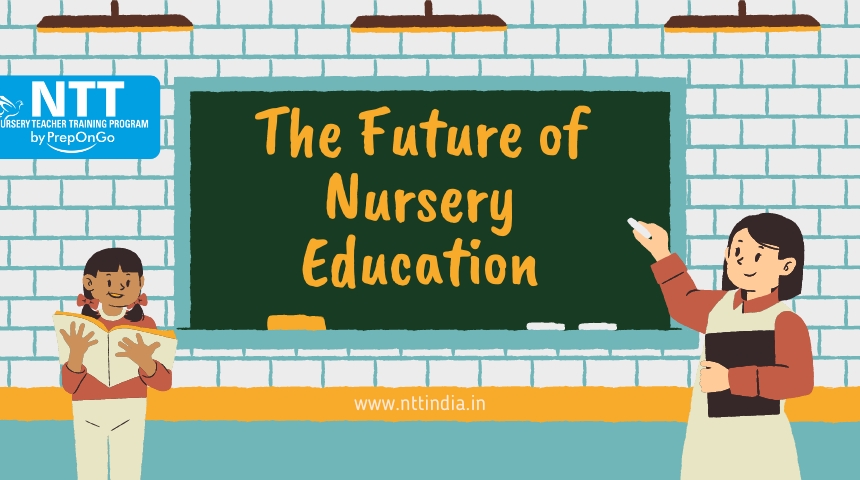The Future of Nursery Education

The landscape of nursery education is rapidly evolving, shaped by technological advancements, changing societal needs, and new research in early childhood development. As we look to the future, it’s crucial for nursery teachers to stay informed about emerging trends that will redefine how young children learn and grow. By understanding these trends, teachers can better prepare their classrooms and curricula to meet the needs of the next generation of learners.
1. Technology Integration in Early Learning
Technology is becoming an integral part of nursery education, offering new ways to engage young learners. Interactive apps, educational games, and digital storytelling are just a few examples of how technology can enhance traditional teaching methods.
- Interactive Learning Tools: Tools like tablets and smartboards are making lessons more dynamic and interactive. These technologies allow for personalized learning experiences, helping children grasp concepts at their own pace.
- Virtual and Augmented Reality: VR and AR are gradually making their way into early education, offering immersive learning experiences that can make abstract concepts more tangible. Imagine children exploring a rainforest or diving into the ocean without leaving the classroom.
2. Focus on Social-Emotional Learning (SEL)
As the importance of emotional intelligence becomes more recognized, there is a growing emphasis on social-emotional learning in nursery education. SEL programs help children develop skills like empathy, self-regulation, and effective communication.
- Mindfulness Practices: Incorporating mindfulness exercises into the daily routine can help children manage stress, improve focus, and develop a greater sense of self-awareness.
- Emotionally Supportive Classrooms: Teachers are creating environments that foster emotional safety, where children feel comfortable expressing their feelings and navigating social interactions.
3. Personalized and Differentiated Learning
Recognizing that each child is unique, there is a shift towards personalized and differentiated learning in nursery education. This approach tailors instruction to meet the individual needs, strengths, and interests of each child.
- Adaptive Learning Technologies: These technologies adjust the difficulty of tasks based on a child’s performance, ensuring that each learner is appropriately challenged and supported.
- Flexible Curricula: Teachers are moving away from one-size-fits-all approaches, instead creating flexible lesson plans that accommodate different learning styles and paces.
4. Emphasis on Play-Based Learning
Play is essential for young children’s development, and its role in education is being increasingly recognized. Play-based learning encourages creativity, problem-solving, and social skills, all while making learning fun and engaging.
- Exploratory Play: Teachers are creating more opportunities for exploratory play, where children are free to investigate, experiment, and learn through discovery.
- Structured vs. Unstructured Play: There is a balance being struck between structured play activities that guide learning and unstructured play that allows for creativity and self-expression.
5. Outdoor and Nature-Based Education
As concerns about screen time and the indoor lifestyle grow, there is a renewed focus on outdoor and nature-based education. This trend emphasizes the importance of physical activity, connection with nature, and learning through exploration.
- Forest Schools: Some nursery programs are adopting the Forest School model, where children spend significant time outdoors, learning about the environment and developing a connection with nature.
- Outdoor Classrooms: Even in urban settings, outdoor classrooms are becoming more popular, providing children with fresh air and space to move while they learn.
6. Inclusion and Diversity in the Classroom
Diversity and inclusion are at the forefront of many educational initiatives, with a focus on creating classrooms that reflect and respect the diverse backgrounds of all students.
- Culturally Responsive Teaching: Teachers are incorporating diverse perspectives into their curricula, ensuring that all children see themselves represented in the lessons they learn.
- Inclusive Practices: There is a push towards inclusive education, where children of all abilities are welcomed and supported. This includes adapting teaching methods and classroom environments to meet the needs of all learners.
7. Parental Involvement and Collaboration
Recognizing that parents are key partners in a child’s education, there is an increased emphasis on parental involvement. Teachers are finding new ways to collaborate with parents and engage them in their child’s learning journey.
- Parent-Teacher Communication Apps: Digital platforms are making it easier for teachers to communicate with parents, sharing updates, progress reports, and tips for supporting learning at home.
- Workshops and Resources: Schools are offering workshops and resources to help parents understand modern teaching methods and how they can reinforce these at home.
8. Sustainability and Eco-Friendly Education
As environmental awareness grows, sustainability is becoming a key focus in nursery education. Teachers are finding creative ways to incorporate eco-friendly practices into their classrooms and lessons.
- Green Classrooms: There is a trend towards creating eco-friendly classrooms, using sustainable materials, and teaching children about recycling, conservation, and the importance of caring for the planet.
- Gardening and Environmental Projects: Schools are engaging children in gardening and other environmental projects, helping them learn about nature and sustainability in a hands-on way.
Conclusion: Embracing the Future of Nursery Education
The future of nursery education is filled with exciting possibilities, as new trends reshape how we approach early childhood learning. By staying informed and adaptable, nursery teachers can ensure they are prepared to meet the challenges and opportunities these trends present.
As technology continues to advance, and our understanding of child development evolves, the role of the nursery teacher will be more crucial than ever. By embracing these trends, teachers can create rich, engaging, and supportive learning environments that prepare young children for a bright and promising future.
